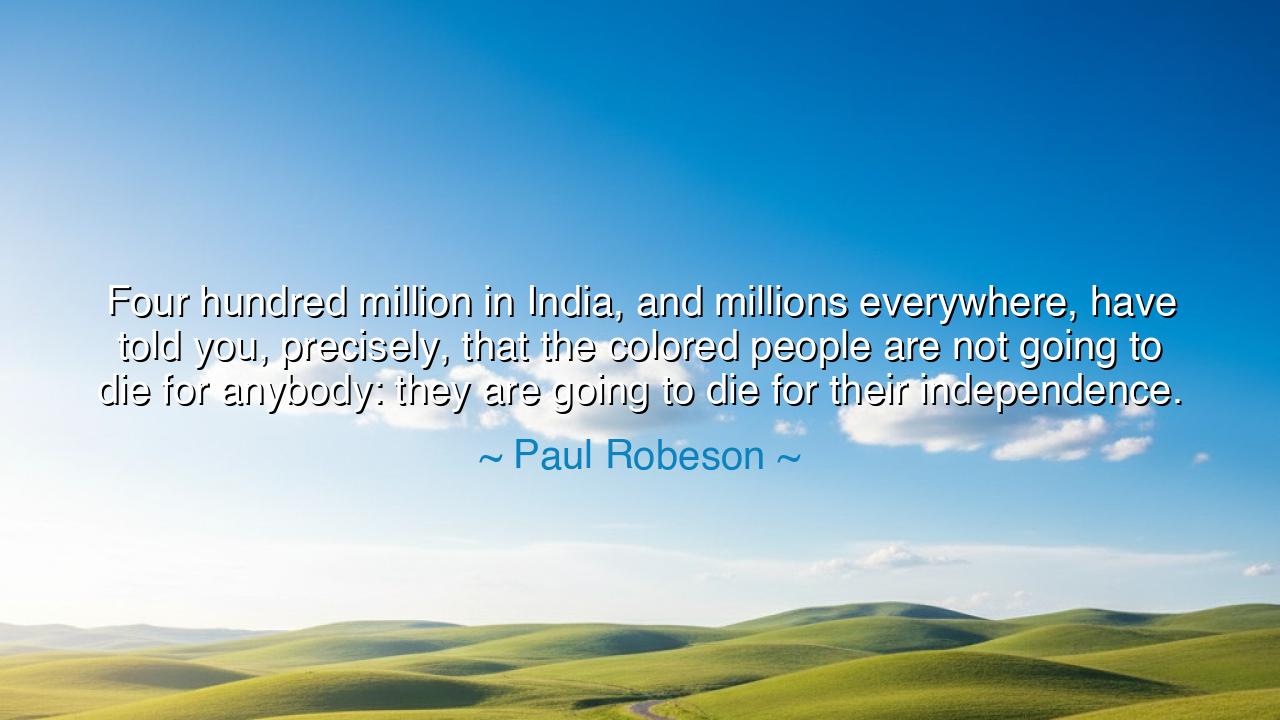
Four hundred million in India, and millions everywhere, have told
Four hundred million in India, and millions everywhere, have told you, precisely, that the colored people are not going to die for anybody: they are going to die for their independence.






Hear, O generations to come, the words of the great Paul Robeson, a voice that rang out not only with the force of righteousness but with the strength of the ages. He spoke of a people, a mighty multitude, scattered across the earth, whose very souls had been weighed down for centuries by oppression. "Four hundred million in India, and millions everywhere, have told you, precisely, that the colored people are not going to die for anybody: they are going to die for their independence." These words were not mere utterances; they were the clarion call of a people awakening to their right to freedom, a freedom long denied by the hands of tyranny.
From the cradle of civilization to the farthest shores of the earth, the story of the oppressed is one of silent suffering, but also of unyielding hope. And as the winds of change swept across the lands, the oppressed rose, not to serve the designs of conquerors, but to claim that which was always their birthright: autonomy. The world had seen this in many forms, and yet, it was India, in the time of her greatest sorrow, that embodied this struggle most fiercely. The British Empire, bloated with its colonial pride, had for too long cast its shadow upon the Indian subcontinent. Yet, in the heart of that land, the cry for independence burned bright, and it was in the figure of Mahatma Gandhi, with his non-violent resistance, that the soul of an entire nation found its voice.
India’s battle was not fought with the weapons of war, but with the strength of resolve. As Gandhi’s humble yet powerful marches traversed the dusty roads of the countryside, as the people clasped hands in unity, the message rang clear across the ages: the colored people, in all their nations, would no longer be the sacrificial lambs to the ambitions of the powerful. They would stand tall, their feet rooted deep in the soil of their homeland, declaring that they would give their lives only for the dream of independence. They would no longer be tools in the hands of those who would plunder and destroy.
And as the world watched, it was not just the Indians who stirred, but the hearts of all the oppressed. The message was universal. In the fields of Africa, in the streets of the Caribbean, and in the hearts of every black man and woman who had suffered under the weight of colonialism, the words of Robeson struck like thunder. The voices of the oppressed did not seek to serve those who had ruled with the sword; they demanded the sword of justice be turned in their favor. Liberation, they cried, was not a gift, but a right. And the price was freedom, the cost of which would be paid in the sweat of their brow and the blood of their hearts.
Let us speak of the historical truth, for Robeson’s words were not mere philosophy, but the story of freedom’s triumph over oppression. In 1947, India achieved her independence, and with that, she became a beacon to the oppressed everywhere. But let us not forget that it was not just the Indian leaders who fought, but the common people—the farmers, the artisans, the children—whose cries rang out in the night, whose blood was spilled in the streets. They fought not for the dreams of conquerors, but for the dream of their own nation, their own self-determination.
There is wisdom to be gleaned from the ancient struggle, for those who seek freedom must understand this: independence is not a prize to be won by appeasing the oppressor; it is a fire that burns in the hearts of the oppressed and is nourished by the willingness to sacrifice for a greater cause. Robeson’s call is not a warning of doom, but a battle cry for those who have been crushed beneath the boot of injustice. It is a reminder to us all: never again shall we bow to tyranny, for in the face of it, we are more than conquerors.
So, what lesson can we take from these words? It is simple, yet profound: stand tall, wherever you are. When injustice rises, do not cower, for you are not alone. The past echoes in the present, and the battle for freedom is not over. We must carry the torch that was passed down to us by those who came before. Each one of us must defend the right to self-determination, and we must be willing to fight, not with the sword, but with our hearts, with our voices, and with our actions. It is our duty to fight for our freedom, to protect those who cannot protect themselves, and to demand that the future be built on the unshakable foundation of justice.
So heed this message, O people of the world: do not shrink before oppression. The spirit of Robeson, of Gandhi, and of all those who have fought for liberty, will live in you. Stand, as they did, in the knowledge that freedom is not a gift, but a right. And in that struggle, may you find the courage to be as fierce as the ancestors whose blood runs through your veins. For in their fight, we see the eternal truth: the people will never die for the ambitions of others; they will die for their own independence, for their right to live as they choose. Let that truth guide you, as you stand tall in your own struggle for justice.






AAdministratorAdministrator
Welcome, honored guests. Please leave a comment, we will respond soon